State of the Empire: 1600
A hundred years of prosperity and expansion had transformed the Empire, and Imperial society as a whole, into something much greater. The Elysian Eagle had spread its wings. With the Imperial Census of 1600 completed, the new Elysian Emperor Basil I was presented with the new census and like his predecessors before him, wanted to know the capabilities of the Empire.
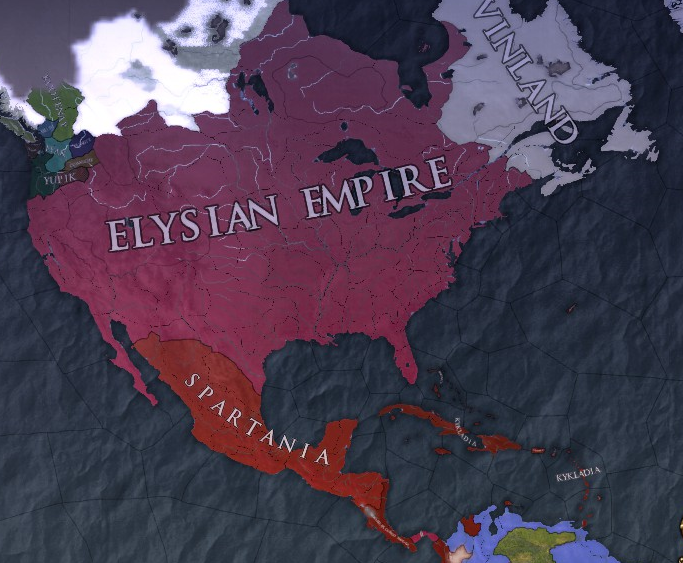
From sea to shining sea, the Empire ruled the civilized lands of the East and West. A century of explosive growth had seen the Empire’s size and population grow rapidly. With a couple of million citizens now under Imperial domain, the frontier to the northwest was ignored for now. Instead, a more attractive alternate existed within the islands of the Pacific Ocean. With Emperor Manuel speaking about the Mare Nostrum becoming the “Mare Nostrum” of Elysia, expansion efforts were currently focused on securing the bounty of islands in the pacific, and slowly taming the northerners of Vinland for their arrogance.
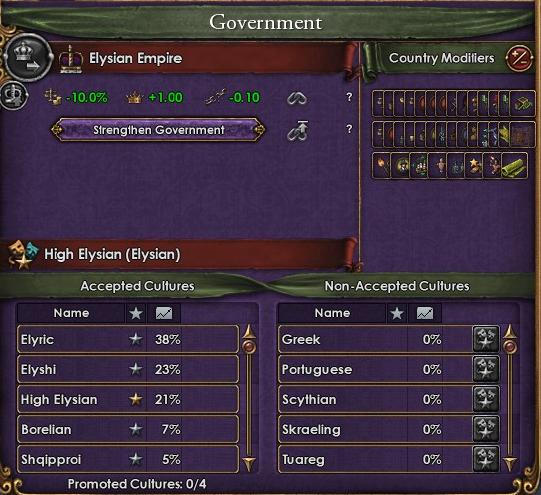
Imperial government, since the reformations undertaken by Emperor Manuel almost a century ago, had been characterised by the strength of the Elysian Senate and its Emperor. Since this reformation, the Empire was well known across Europe for its incredibly strong and stable Imperial government. With the traditions of the senate being retained from the times of Rome, the Senatorial Empire operated on both republican and monarchist characteristics and utilize them to its fullest extent.
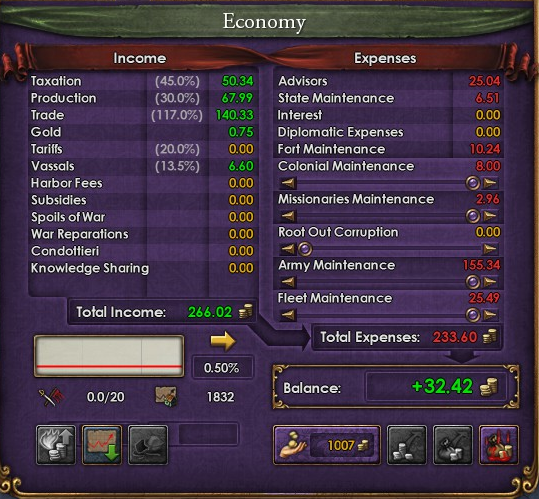
While incredibly prosperous in its own right, the Empire had been overspending within the military in order to maintain their large presence in Europe, which was focused on protecting and aiding the Exarch states. Once conditions stabilized in Europe to safe-levels and the Exarchs were able to protect themselves, which could be many years away, the Empire couldn’t utilize the economy to the best of their ability.
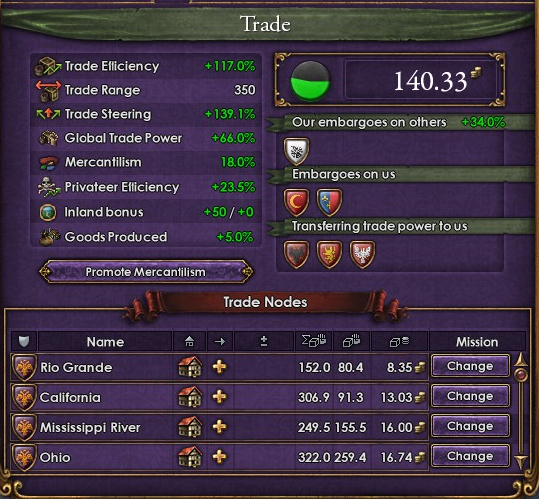
All trade markets on the continent of Elysium was dominated by the Empire. Elysia held a monopoly on the goods that came from the continent which were sought after in Europe, such as Elysian silk. Although Vinland and Spartania had some involvement in the matters of trade, they couldn’t even come close to the levels that Elysia held over the market.

The Elysian army and navy, was, in a controversial aspect, the most powerful military in the world. Over a century of drilling had transformed the Elysian military from a drafted military to a professional standing army with intense and brutal training conditions comparable to the Legionaries of Ancient Rome. The advantages of new military technology had been largely responsible for Elysia to secure their dominance on the continent, as native armies were simply useless to combat a Thema. In order to maintain this dominance, the Empire must pay an extremely heavy price to finance the military.

Elysification of the continent was extremely effective as the Empire’s influence was felt from coast to coast. The Elysian Language, either as a main tongue, secondary language or a minority language, was the dominant language in the new world with immense cultural influence. Despite its regional dialects, the language had remained the same from its traditional Hellenic origins, but had diverged enough from the standard Hellenic that it was considered a separate language in its own right. Native languages, except in some isolated pockets around the Empire, were virtually extinct as many natives embraced the Elysian language after decades of integration.
As a culture, Elysia was unique in its very own right. It had a Hellenic heart but a Roman soul. Philosophers both from Europe and Elysia remarked on how on a societal aspect, Elysian culture shared more common characteristics Rome rather than Greek, and Elysia had been embracing this for quite some time. In comparison to the Spartan-esc hybrid culture of Spartania, Elysian culture was a hybrid culture that embraced the best of Hellenic and Roman culture.

During the previous century, the Empire had gained plenty of loyal subjects in both Europe and Elysium. With the establishment of the Exarchs and the Balkan shield, entire nations were now serving the Emperor and Elysia. Either by willingly wanting to serve the Empire for a greater good, protection, or any other means. With such loyal subjects, it was the duty of every Elysian monarch to show compassion to the growing realm.

Nea Konstantinopolis, the fabulously wealthy capital of the vast Imperium, had exploded in population within the previous hundred years. In part due to the population policies enacted by the Empire, drastically improved standards of living and a stable climate, the capital now had a population of just over 300,000 inhabitants. Interestingly, immigrants from Europe and elsewhere in the old world had slowly started to immigrate to the Empire, wishing to make new lives and opportunities in the crown jewel of of Elysium
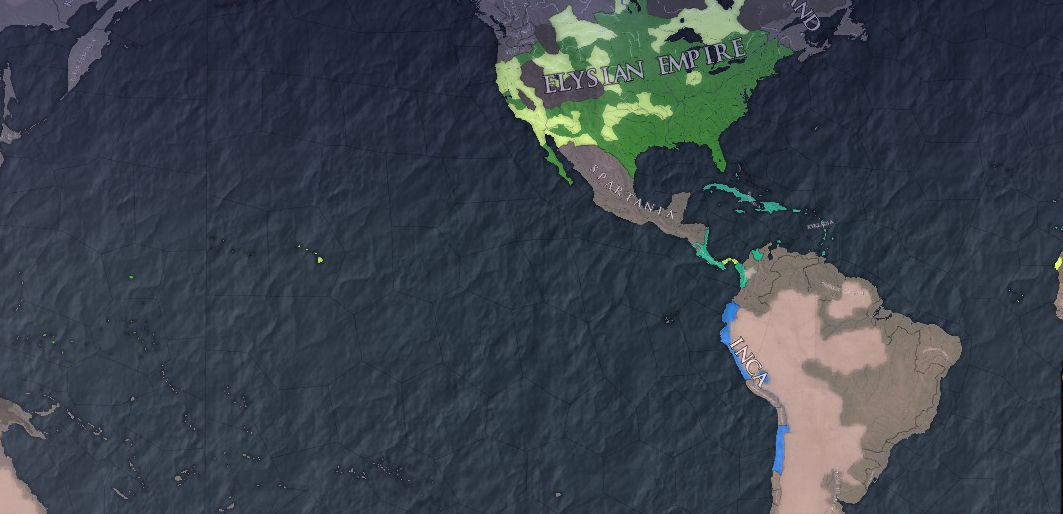
From sea to sea, loyal allies and subjects and a rapidly growing nation, the next century presented the opportunities for the Empire to shine to levels that had it never reached before. The Golden Age of Elysia, for the time being, was over. The Empire had matured and was now entering a new phase of its life, where both the East and the West were now well within the possibility of Elysian rule. The last century was an Elysian century. The 17th century was to be a century of miracles.
Long live the Empire
A hundred years of prosperity and expansion had transformed the Empire, and Imperial society as a whole, into something much greater. The Elysian Eagle had spread its wings. With the Imperial Census of 1600 completed, the new Elysian Emperor Basil I was presented with the new census and like his predecessors before him, wanted to know the capabilities of the Empire.
From sea to shining sea, the Empire ruled the civilized lands of the East and West. A century of explosive growth had seen the Empire’s size and population grow rapidly. With a couple of million citizens now under Imperial domain, the frontier to the northwest was ignored for now. Instead, a more attractive alternate existed within the islands of the Pacific Ocean. With Emperor Manuel speaking about the Mare Nostrum becoming the “Mare Nostrum” of Elysia, expansion efforts were currently focused on securing the bounty of islands in the pacific, and slowly taming the northerners of Vinland for their arrogance.
Imperial government, since the reformations undertaken by Emperor Manuel almost a century ago, had been characterised by the strength of the Elysian Senate and its Emperor. Since this reformation, the Empire was well known across Europe for its incredibly strong and stable Imperial government. With the traditions of the senate being retained from the times of Rome, the Senatorial Empire operated on both republican and monarchist characteristics and utilize them to its fullest extent.
While incredibly prosperous in its own right, the Empire had been overspending within the military in order to maintain their large presence in Europe, which was focused on protecting and aiding the Exarch states. Once conditions stabilized in Europe to safe-levels and the Exarchs were able to protect themselves, which could be many years away, the Empire couldn’t utilize the economy to the best of their ability.
All trade markets on the continent of Elysium was dominated by the Empire. Elysia held a monopoly on the goods that came from the continent which were sought after in Europe, such as Elysian silk. Although Vinland and Spartania had some involvement in the matters of trade, they couldn’t even come close to the levels that Elysia held over the market.
The Elysian army and navy, was, in a controversial aspect, the most powerful military in the world. Over a century of drilling had transformed the Elysian military from a drafted military to a professional standing army with intense and brutal training conditions comparable to the Legionaries of Ancient Rome. The advantages of new military technology had been largely responsible for Elysia to secure their dominance on the continent, as native armies were simply useless to combat a Thema. In order to maintain this dominance, the Empire must pay an extremely heavy price to finance the military.
Elysification of the continent was extremely effective as the Empire’s influence was felt from coast to coast. The Elysian Language, either as a main tongue, secondary language or a minority language, was the dominant language in the new world with immense cultural influence. Despite its regional dialects, the language had remained the same from its traditional Hellenic origins, but had diverged enough from the standard Hellenic that it was considered a separate language in its own right. Native languages, except in some isolated pockets around the Empire, were virtually extinct as many natives embraced the Elysian language after decades of integration.
As a culture, Elysia was unique in its very own right. It had a Hellenic heart but a Roman soul. Philosophers both from Europe and Elysia remarked on how on a societal aspect, Elysian culture shared more common characteristics Rome rather than Greek, and Elysia had been embracing this for quite some time. In comparison to the Spartan-esc hybrid culture of Spartania, Elysian culture was a hybrid culture that embraced the best of Hellenic and Roman culture.
During the previous century, the Empire had gained plenty of loyal subjects in both Europe and Elysium. With the establishment of the Exarchs and the Balkan shield, entire nations were now serving the Emperor and Elysia. Either by willingly wanting to serve the Empire for a greater good, protection, or any other means. With such loyal subjects, it was the duty of every Elysian monarch to show compassion to the growing realm.
Nea Konstantinopolis, the fabulously wealthy capital of the vast Imperium, had exploded in population within the previous hundred years. In part due to the population policies enacted by the Empire, drastically improved standards of living and a stable climate, the capital now had a population of just over 300,000 inhabitants. Interestingly, immigrants from Europe and elsewhere in the old world had slowly started to immigrate to the Empire, wishing to make new lives and opportunities in the crown jewel of of Elysium
From sea to sea, loyal allies and subjects and a rapidly growing nation, the next century presented the opportunities for the Empire to shine to levels that had it never reached before. The Golden Age of Elysia, for the time being, was over. The Empire had matured and was now entering a new phase of its life, where both the East and the West were now well within the possibility of Elysian rule. The last century was an Elysian century. The 17th century was to be a century of miracles.
Long live the Empire
Last edited:

